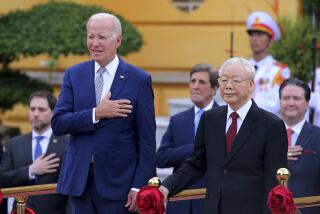ASIA WATCH : The War Is Over
Washington appears to be moving forward with one piece of the unfinished business of the previous Administration: normalizing relations with Vietnam. If the Vietnamese fulfill their obligations on the MIA-POW issue, the U.S. trade embargo could be lifted. It should be.
In the first high-level U.S.-Vietnamese meeting, U.S. officials, including Assistant Secretary of State William Clark, met with Trinh Xuan Lang, Vietnam’s outgoing ambassador to the United Nations. The talks were secret until disclosed by The Times.
The Administration, attempting to work out its policy toward Vietnam, is said to be considering lifting the embargo soon--perhaps in time for the late April meeting of the International Monetary Fund, which will decide whether to end a longstanding freeze on lending to Vietnam.
The United States stands alone in its ban on trade with Vietnam. If the IMF and the World Bank resume lending but the U.S. embargo remains, U.S. firms--but not European and Asian firms--will be shut out of Vietnamese contracts.
U.S. companies are now allowed to open offices and sign contracts to do business in Vietnam, but those deals cannot take effect until the embargo is lifted. Bank of America’s recently announced Hanoi office, for example, will not be able to accept deposits or make loans.
Vietnam is a tough call because of the politically volatile MIA-POW issue. But isolating Hanoi is old Cold War politics. President Clinton’s challenge is to show Americans why it makes sense to take a new approach to dealing with Vietnam.
More to Read
Sign up for Essential California
The most important California stories and recommendations in your inbox every morning.
You may occasionally receive promotional content from the Los Angeles Times.









